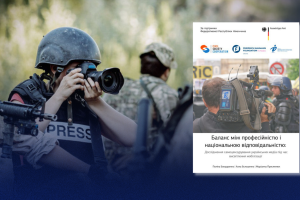
Data presentation organized by the Ilko Kucheriv Democratic Initiatives Foundation in memory of Iryna Bekeshkina, famous Ukrainian sociologist, director of the Foundation from 2010 to 2020.
During December 2020 Kyiv International Institute of Sociology (KIIS) conducted two all-Ukrainian opinion polls in all regions of Ukraine except Autonomous Republic of Crimea and some areas of Luhansk and Donetsk oblasts. The surveys were conducted by CATI (computer assisted telephone interviews) and face-to-face interviews. The sample consisted of 2001 respondents (age 18 or older) for each of the surveys. The theoretical sampling error not exceeding 3.3% for the first survey and 2.4% for the second survey.
For comparison, we provide data from surveys conducted in different years by Kyiv International Institute of Sociology. In the course of the study, respondents were asked about their level of trust in various social institutions and parties, as well as in sociological surveys.
- Volunteers have the greatest trust of Ukrainians — both those who help the army and those who help IDPs—74% and 66%, respectively. Ukrainians also trust their neighbors: 67% trust ordinary people in their locality. 41% trust IDPs. It is worth noting that compared to last year's results, this indicator has increased by 4%.
- Among institutions, the Armed Forces of Ukraine have the highest level of public trust — 66%. 52% of respondents trust the church, and 39% trust non-governmental organizations.
- Russian media have the lowest level of trust in Ukrainian society — only 4%. As for Ukrainian media, 30% of the population trust them.
Diagram 1 shows the regional distribution of the trust and distrust balance in social institutions (the percentage of those who trust, minus the percentage of those who distrust).
.png)
- Except the Armed Forces of Ukraine other state institutions on the list have a negative trust and distrust balance (the percentage of those who trust, minus the percentage of those who distrust).
- Among the institutions of the central government Ukrainians least trust the Verkhovna Rada (12%) and the Government (14%). As for the institution of the President, the level of trust in it is about one-third.
- 34% of respondents trust the Patrol Police (compared to 30% in 2018), and 29% in general trust the National Police (the same number in 2018). 27% of respondents trust the Security Service of Ukraine (SBU) (compared to 21% in 2018).
Diagram 2 shows the regional distribution of the trust and distrust balance in social institutions (the percentage of those who trust, minus the percentage of those who distrust). From West to East, trust in state institutions is declining.
.png)
- As for the parliamentary parties, not more than a quarter of respondents trust them. At the time of the survey, the party "Servant of the People" was trusted by the most respondents—25%. 21–22% each trust "European Solidarity", "Batkivshchyna," and "Opposition Platform — For Life".
- In the West, the lowest level of trust in the representatives of the "Opposition Platform — For Life" party — 65% of respondents there do not trust it (11% do). Meanwhile, the parties "European Solidarity" and "Servant of the People" are trusted by 30% and 26%, respectively. For respondents from the central regions of Ukraine, trust in the parties "Servant of the People" and "Batkivshchyna" is typical — trust in both is 26%, slightly lower is trust in "European Solidarity" (22%). The last places in the trust rating among the parties are occupied by "Holos" and Opposition Platform — For Life —17% and 16%, respectively. In eastern Ukraine, the "Opposition Platform — For Life" party is the most trusted—37%. In the South, this party has 29% trust, only 3% more than "Servant of the People".
- As for sociological organizations, the survey showed that about 40% of Ukrainians trust them. It is worth noting that this level of trust only concerns those sociological organizations that have been working for a long time and publish the results of their research. In general, over the past 17 years, the level of public trust in the sociological organizations has significantly increased from 36% in 2002 to 47% in 2004. Then, in 2015–2016, it reached 50% but began to fall down to 41% in 2020 (although it is still higher than the level of 2002). The balance of trust/distrust during this period increased from 7% in 2002 to 20% in 2020.
.png)
Table 1. Level of trust in institutions
| Trust | Do not trust | The trust and distrust balance |
President of Ukraine | 32 | 45 | -13 |
Verkhovna Rada of Ukraine | 12 | 67 | -55 |
Government of Ukraine | 14 | 61 | -47 |
Armed Forces of Ukraine | 66 | 15 | 52 |
Security Service of Ukraine (SBU) | 27 | 42 | -15 |
National Police | 29 | 46 | -17 |
Patrol police | 34 | 39 | -5 |
Church | 52 | 25 | 27 |
Ukrainian media | 30 | 43 | -13 |
Russian media | 4 | 78 | -74 |
Political party "Servant of the People" | 25 | 54 | -29 |
Political party "European Solidarity" | 22 | 58 | -36 |
Political party "OPZZh" | 21 | 57 | -36 |
Political party "Batkivshchyna" | 22 | 58 | -36 |
Political party "Holos" | 16 | 56 | -40 |
Non-governmental organizations | 39 | 23 | 16 |
Ordinary people in your locality | 67 | 12 | 55 |
IDPs | 41 | 18 | 23 |
Volunteers who help the army | 74 | 10 | 64 |
Volunteers who help IDPs | 66 | 10 | 56 |
Table 2. Level of trust in institutions: regional distribution
| West
| Center | South | East | ||||||||
| Trust | Do not trust | Balance | Trust | Do not trust | Balance | Trust | Do not trust | Balance | Trust | Do not trust | Balance |
President of Ukraine | 33 | 44 | -10 | 31 | 43 | -12 | 34 | 45 | -10 | 28 | 50 | -22 |
Verkhovna Rada of Ukraine | 10 | 65 | -54 | 15 | 65 | -51 | 11 | 67 | -56 | 12 | 74 | -62 |
Government of Ukraine | 13 | 57 | -45 | 16 | 61 | -45 | 15 | 60 | -46 | 12 | 68 | -56 |
Armed Forces of Ukraine | 79 | 7 | 72 | 69 | 11 | 58 | 60 | 20 | 40 | 46 | 28 | 18 |
Security Service of Ukraine (SBU) | 24 | 40 | -15 | 27 | 42 | -16 | 28 | 44 | -16 | 28 | 42 | -14 |
National Police | 31 | 43 | -12 | 28 | 48 | -20 | 28 | 48 | -21 | 30 | 46 | -16 |
Patrol police | 35 | 37 | -1 | 34 | 39 | -4 | 31 | 43 | -11 | 34 | 39 | -5 |
Church | 73 | 13 | 60 | 46 | 28 | 18 | 43 | 33 | 11 | 44 | 28 | 16 |
Ukrainian media | 33 | 36 | -2 | 32 | 40 | -8 | 27 | 51 | -24 | 24 | 49 | -25 |
Russian media | 3 | 86 | -83 | 2 | 82 | -81 | 9 | 71 | -62 | 5 | 64 | -59 |
Political party "Servant of the People" | 26 | 52 | -27 | 26 | 53 | -27 | 26 | 56 | -29 | 18 | 58 | -40 |
Political party "European Solidarity" | 30 | 45 | -15 | 22 | 58 | -36 | 16 | 66 | -50 | 14 | 68 | -54 |
Political party "OPZZh" | 11 | 65 | -54 | 16 | 62 | -46 | 29 | 52 | -23 | 37 | 40 | -2 |
Political party "Batkivshchyna" | 21 | 53 | -33 | 26 | 55 | -29 | 21 | 64 | -43 | 13 | 63 | -50 |
Political party "Holos" | 24 | 45 | -21 | 17 | 53 | -36 | 9 | 68 | -59 | 12 | 65 | -52 |
Non-governmental organizations | 44 | 19 | 25 | 38 | 24 | 15 | 38 | 27 | 10 | 36 | 22 | 14 |
Ordinary people in your locality | 71 | 12 | 59 | 67 | 12 | 55 | 63 | 13 | 50 | 67 | 12 | 56 |
IDPs | 40 | 19 | 21 | 38 | 20 | 18 | 41 | 18 | 23 | 49 | 13 | 35 |
Volunteers who help the army | 85 | 4 | 81 | 76 | 9 | 67 | 67 | 13 | 54 | 63 | 18 | 45 |
Volunteers who help IDPs | 71 | 8 | 63 | 67 | 9 | 59 | 59 | 11 | 48 | 66 | 13 | 53 |
Table 3. Do you trust the results of sociological surveys of organizations that have been working for a long time and publish the results of their research? % surveyed
| 2002 | 2004 | 2009 | 2012 | 2013 | 2014 | 2015 | 2016 | 2017 | 2018 | 2019 | 2020 |
Yes | 36 | 47 | 45 | 51 | 46 | 48 | 50 | 50 | 47 | 43 | 42 | 41 |
Difficult to answer | 32 | 37 | 35 | 34 | 37 | 40 | 36 | 35 | 41 | 35 | 36 | 36 |
No | 29 | 13 | 14 | 13 | 15 | 9 | 10 | 14 | 11 | 20 | 21 | 21 |
Refusal to answer | 3 | 3 | 6 | 2 | 2 | 3 | 4 | 2 | 1 | 3 | 1 | 1 |
The trust and distrust balance | 7 | 34 | 31 | 38 | 31 | 39 | 40 | 36 | 36 | 23 | 21 | 20 |








